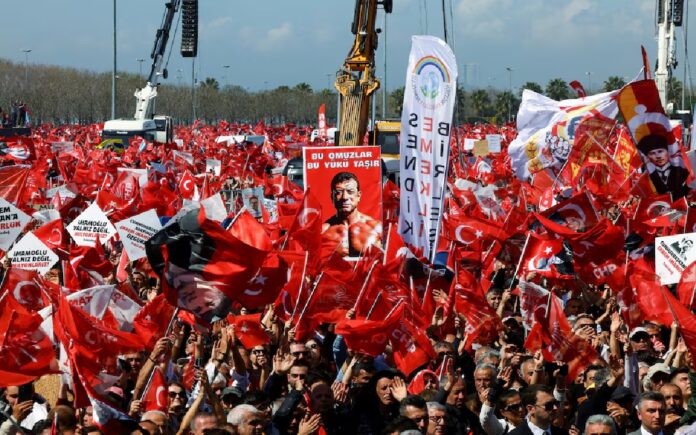Ankara: Turkey’s government has strongly condemned opposition-led calls for a nationwide commercial boycott following the arrest of Istanbul Mayor Ekrem Imamoglu, branding the move an economic “sabotage attempt”.
The main opposition Republican People’s Party (CHP) initially urged consumers to boycott businesses perceived to have ties with President Tayyip Erdogan’s government after Imamoglu’s detention two weeks ago. On Wednesday, the protest escalated, with activists expanding the campaign to a one-day halt in all shopping activities. Some businesses closed in solidarity, viewing the boycott as a statement against what they see as an anti-democratic move to weaken the opposition ahead of future elections.
Imamoglu, widely regarded as Erdogan’s strongest political rival, is also the CHP’s presidential candidate. His arrest has fueled public outrage, leading to some of the largest street protests in Turkey in over a decade.
Shops remained shut and cafe tables were empty as Turkey's opposition called for a mass commercial boycott protesting the arrest of Istanbul Mayor Ekrem Imamoglu. The government condemned the protest, calling it an economic 'sabotage attempt' https://t.co/FTcUrcWkn5 pic.twitter.com/fuVuNMLfT9
— Reuters (@Reuters) April 2, 2025
Government Response
Trade Minister Omer Bolat denounced the boycott, arguing that it threatens economic stability and aims to undermine the ruling administration.
“They are an attempt to sabotage the economy and include unfair trade and competition elements. We see this as a futile attempt by circles who consider themselves the masters of this country,” Bolat stated.
During a televised interview with state broadcaster TRT, Bolat directly addressed the public, urging them to resist the boycott.
“I have a call for our citizens. If you have any shopping plans for today, tomorrow, the day after, or in the coming days, we strongly encourage you to make your purchases and conduct your business today,” he said, later reiterating the message across multiple TV networks.
Several cabinet ministers and pro-government figures, including former Germany and Real Madrid soccer star Mesut Ozil, voiced their opposition using the hashtag #BoykotDegilMilliZarar (“Not a Boycott, but National Damage”).
Public Reaction and Economic Impact
The boycott visibly affected commerce in major cities. In Istanbul and Ankara, cafes that are usually bustling sat nearly empty, and many shop owners reported a noticeable decline in customers.
Hayrettin, a shop owner in central Istanbul who declined to give his surname, defended the boycott, arguing it was necessary to hold the government accountable.
“The boycott is the right decision. It should have happened sooner. It’s something we need to do. People need to show their reaction. If they (the government) continue this way, the country is getting worse,” he said, noting that neighboring shops had also joined the protest.
Turkey’s economy has been struggling with a prolonged cost-of-living crisis, multiple currency crashes, and persistent inflation, which stood at 39% in February. The protest’s economic implications remain uncertain, but it has already sparked political and legal repercussions.
Also Read | Israel Expands Military Operations in Gaza, Seizing Territory
Legal Crackdown on Boycott Advocates
On Tuesday, Turkish prosecutors launched an investigation into those promoting the boycott both online and offline. The Istanbul Chief Prosecutor’s Office stated it was probing individuals who allegedly sought to “prevent a segment of the public from engaging in economic activity,” citing potential violations of laws against hate speech and incitement of public hostility.
Erdogan, addressing the mounting protests, dismissed them as “evil” and predicted they would dissipate soon. Meanwhile, CHP Chairman Ozgur Ozel continues to rally support, pushing for stronger opposition actions in response to Imamoglu’s arrest.
As tensions rise, the political and economic fallout of the boycott remains to be seen, with Turkey’s deeply polarized landscape growing ever more volatile.



